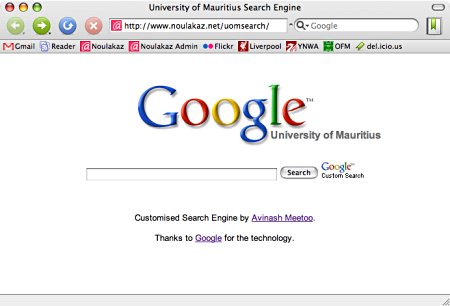
While discussing with some colleagues the other day, I realised that the University of Mauritius website does not have a working search facility. I also realised that it would be nice to be able to search within all UoM websites (like, for example, the CSE website, the Radio Telescope website, etc.) in addition to the main website of the university.
With some Google magic to the rescue, I am proud to announce the official release of
https://www.noulakaz.net/uomsearch/
which I’ve called the University of Mauritius Search Engine.
Have fun!


